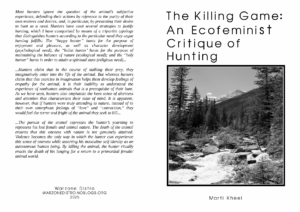
From back cover:
“Most hunters ignore the question of the animal’s subjective experience, defending their actions by reference to the purity of their own motives and desires, and, in particular, by presenting their desire to hunt as a need. Hunters have used several strategies to justify hunting, which I have categorized by means of a tripartite typology that distinguishes hunters according to the particular need they argue hunting fulfills: The “happy hunter” hunts for the purpose of enjoyment and pleasure, as well as character development (psychological need); the “holist hunter’ hunts for the purpose of maintaining the balance of nature (ecological need); and the “holy hunter” hunts in order to attain a spiritual state (religious need)…
…Hunters claim that in the course of stalking their prey, they imaginatively enter into the life of the animal. But whereas hunters claim that this exercise in imagination helps them develop feelings of empathy for the animal, it is their inability to understand the experience of nonhuman animals that is a prerequisite of their hunt. As we have seen, hunters also emphasize the keen sense of alertness and attention that characterizes their state of mind. It is apparent, however, that if hunters were truly attending to nature, instead of to their own amorphous feelings of “love” and “connection,” they would feel the terror and fright of the animal they seek to kill…
…The pursuit of the animal expresses the hunter’s yearning to repossess his lost female and animal nature. The death of the animal ensures that this oneness with nature is not genuinely attained. Violence becomes the only way in which the hunter can experience this sense of oneness while asserting his masculine self-identity as an autonomous human being. By killing the animal, the hunter ritually enacts the death of his longing for a return to a primordial female/animal world.”